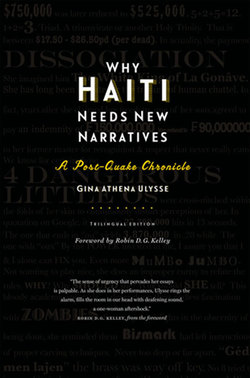Читать книгу Why Haiti Needs New Narratives - Gina Athena Ulysse - Страница 35
На сайте Литреса книга снята с продажи.
Оглавление22
Pawòl Fanm sou Douz Janvye
February 21, 2011 / Meridians
Fòk ou gen volonté pou viv.
(You must have will to live.)
—Solange Veillard David
Anyone you ask, at home or abroad, who can and wants to speak of it, will tell you exactly where they were that afternoon on January 12 at 4:53:10 p.m. when the 7.0 earthquake ruptured Léogâne. Its epicenter sixteen miles from Port-au-Prince, the quake ravaged parts of the capital and decimated cities in the southern parts of the already fragile republic. Over fifty aftershocks followed in the next two weeks, and tsunamis were reported in Jacmel, Les Cayes, Petit-Goâve, Léogâne, Luly, and Anse-à-Galets.
According to official estimates, three hundred thousand people lost lives. Unofficial estimates are actually much higher. The same number suffered injuries, and over 1.3 million were displaced. The number of reports of property damage to homes and businesses also reached hundreds of thousands. Places of worship (churches and temples), art centers, schools, and government ministries were flattened like sandwiches (as people call them), destroying familial and fictive ties, already limited resources, and archives of all kinds, for they embodied historical as well as social memories.
In the immediate aftermath, many among the living became part of a new population of amputees, and the psychological effects of the trauma remain trapped in the bodies of those who, to this day, have yet to have access to the psychosocial services necessary to alleviate the post-traumatic stress disorder and other ills that now entrap them.
Those of us lot bo dlo, or “on the other side of the water,” as they say, who make our homes elsewhere, experienced what would become new signifiers for the space that stretches between here and there, making us part of Haiti’s diaspora. We watched the stories develop on television. With phone lines down and others types of communication inaccessible, it would take days and, in some instances, weeks and even months to learn what had happen to some of our kin. In other cases, such news is constructed from deductive reasoning, since it is clear that, at this point, if we have not heard from or of our friends and relatives, then they must have perished. The specifics (when, where, and how) remain mysteries, as the possibility of closure is even more improbable in many cases, given the logistics of displacement, the inhumane government discard of the dead, and the economics of retrieval.
It is said that 70 percent of Haiti’s diaspora (numbered at around one million) has suffered direct loss. The 30 percent who were not impacted directly remain implicated, because all of us know of someone who knows someone who knows someone else who perished in the quake. Actually, in most cases, all it takes is one degree of separation.
As with any other natural disaster, it is women who are disproportionately affected. The situation in Haiti was no different. In fact, in some ways, it was worse. As the potomitan of their families,24 women bear the responsibility of having to be present to care for their children, parents, and other dependent family members. With little to no infrastructure and in the absence of a state that has historically abandoned its nation, services were delivered to very few.
